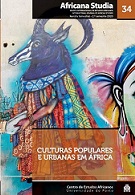Associativismo sino-moçambicano e o caso do Wushu: história, atualidade e perspetivas
Abstract
The Chinese presence in Mozambique started at the beginning of the 19th century, when a first group of 30 craftsmen coming from Canton were contracted under the request of the then Portuguese General-Governor. This community grew constantly during the colonial era, originating an associative, cultural and sports movement which had, as its apogee, basketball in Beira, with Atlético Chines and a first diffusion of Wushu. After the independence, just one hundred of Chinese people remained in
Mozambique; for, cultural and sports activities suffered a serious crisis, and they were resumed only in the new century, when (2005) Mozambican State returned the installations where traditionally the Cultural China-Mozambique Centre and the Chinese School of Maputo worked, and Master Cheng Fu Wang started to teach Wushu. Based on direct observation for one year, together with interviews and informal conversations with Wushu practitioners, an analysis on the development and the perspectives of this sport in Mozambique is presented. The conclusion is that today Wushu in Mozambique has transcended the voluntary phase which it experienced until 2014, but still far from the transformation of the current association into a federation, due to its concentration in Maputo.
Keywords: Chinese culture, origins, sport, diffusion.
Downloads
Downloads
Published
How to Cite
Issue
Section
License
Copyright (c) 2021 Africana Studia

This work is licensed under a Creative Commons Attribution-NonCommercial 4.0 International License.
Copyrights of all published material belong to Africana Studia.
Original images supplied by authors will be returned to them if requested


